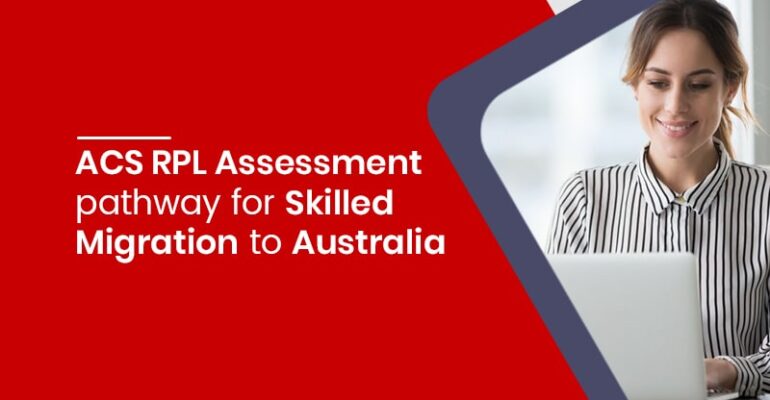ACS Assessment pathways for Skilled Migration

ACS Assessment pathways for Skilled Migration
Australian Computer Society (ACS) is the official Information and Communication Technology (ICT) governing body. ACS assesses potential migrant ICT professionals to ensure they meet the appropriate assessing authority requirements required for employment in Australia’s nominated occupation.
The Australian Computer Society will evaluate your Information technology (IT) abilities, knowledge, and expertise. Remember that the Australian Computer Society considers ICT professionals for skilled migration.
Requirements for Skills Assessment Application
The ACS has been designated a relevant assessing authority for ICT skilled occupations on the List of Eligible Skilled Occupations. Most assessing bodies evaluate applicants’ skills for the specified occupation based on their education, professional license (if any), and work experience.
The following are the most common documents included in these applications:
- Certificate of graduation or award, as well as transcripts
- References for Employment
- If you are applying for Recognition of Prior Learning, you must submit a project details report (RPL)
- Detail Curriculum Vitae (CV)
- Birth certificates, passports, and identification cards are personal identification documents.
In certain situations, applicants may be required to offer a brief overview of each component and its content to demonstrate the degree’s relevance to the skill assessment occupation. It is critical that all papers submitted to the authority be translated, well described, and certified copies made so that your client gets all the significant experience due to a lack of an experience letter or the scope of work performed.
If you wish to apply for skill evaluation in ACS for Australia Immigration, the following is a step-by-step approach that you must follow.
- Department of Home Affairs (DHA) established standards.
Before applying for a skills assessment in Australia, ensure you fulfill the Department of Home Affairs’ qualifying requirements. In this case, if you are a newcomer, it is critical to contact the top MARA-registered consultants in order to successfully apply for a skills evaluation in ACS for Australia Immigration.
- Select an ANZSCO Code that corresponds to your qualifications and work experience.
In the second stage, ensure that you choose the correct ANZSCO code corresponding to your years of experience and degree of education. Examine the job descriptions and responsibilities to determine which code best matches your current qualifications, and then select the appropriate occupations.
The assessing body compares your qualifications and work experience to the criteria of the ANZSCO code. Australia and New Zealand Standard Classification of Occupations (ANZSCO) collect, publishes, and analyzes occupational information across government departments.
The Department uses it to collect information for all visa, settlement, and citizenship programs. Importantly, it is utilized as the criterion by which a visa applicant’s talents and work experience to conduct a certain occupation in Australia are assessed within the skilled visa programs.
ANZSCO specifies the amount of qualification/s and experience necessary to accomplish various positions and the duties an applicant would undertake in that occupation. If you seek a skilled migration visa, the Department case officer considering your visa application will want to see the documentation that you have completed the appropriate credentials and have sufficient work experience as indicated in ANZSCO for the relevant listed occupation.
Read More: Engineering Technologist Immigration to Australia for PR Visa. 🌟🌟
- Application Form
The third step is to complete the application form and acquire all the documentation requested by the ACS. Check that all of your papers are certified copies in excellent PDF format. Also, if you want to avoid dealing with any problems later, ensure that all documents are real and include accurate information.
The ACS has been recognized as a relevant Assessing Authority for ICT skills occupations specified in the List of Qualified Skilled Occupations. The applicants will have many assessment pathways to choose from according to their educational background. Here we will describe four ACS assessment pathways (application types) you can go through according to the criteria required.
Temporary Graduate (TG)
The temporary graduate (TG) application type is for applicants who have completed their Bachelor’s degree or higher level. The degree is to be taken from a renowned Australian university. However, this pathway is a qualification-only skill assessment and can only be chosen by applicants applying for a subclass 485 visa.
Suitability Criteria
- The nominated occupation listed in subclass 485 for the Medium and Long-term Strategic Skills List (MLTSSL) is suitable for a Temporary Graduate pathway.
- An Australian Bachelor’s degree or higher level with a major in the ICT field is relevant to the nominated occupation.
- Satisfy the Australian Study Requirement (ASR) for visa purposes. ACS is not responsible for your ASR requirements. The Department of Home Affairs will carry it out.
Post-Australian Study (PAS)
This application pathway is for applicants who have completed their Australian Bachelor’s degree or higher-level education and would like a skill assessment for migration purposes. Post-Australian Study necessitates the completion of an ACS Professional Year Program or other related employment in the ICT field.
Suitability Criteria
- Australian Bachelor’s degree or higher education level with an ICT major in the nominated field.
- One year of work experience after completing a related Australian degree or a Professional year program.
Skills Assessment (Skills)

This application pathway is used for tertiary ICT qualifications and employment under general skill assessment.
Suitability Criteria
Qualification comparable to AQF Bachelors degree or higher with ICT Major
- Suppose your degree is an ICT major closely related to your occupation. In that case, you need two years of work experience completed in the previous ten or four years of related work experience completed anytime to meet the criteria.
- If your degree is an ICT major and is not closely related to your occupation, you need four years of work experience completed anytime to meet the criteria.
Qualification comparable to AQF Bachelors degree or higher with ICT Minor
- Suppose your degree is an ICT minor closely related to your occupation. In that case, you need five years of related work experience completed in the previous ten or six years of work experience completed anytime to meet the criteria.
- Suppose your degree is an ICT minor and is not closely related to your occupation. In that case, you need six years of related work experience completed at any time to meet the criteria.
Learn More: Everything you need to know about ACS Skill Assessment. 💪💪
Qualification comparable to AQF Diploma or vendor Certification
- Suppose your AQF degree or vendor certification is an ICT major closely related to your occupation. In that case, you need five years of related work experience completed in the previous ten or six years of work experience completed anytime to meet the criteria.
- Suppose your AQF degree or vendor certification is an ICT major and is not closely related to your occupation. In that case, you need six years of related work experience completed at any time to meet the criteria.
Recognition of Prior Learning (RPL)
The RPL application pathway is for applicants with no ICT qualification or applicants with insufficient ICT content or no ICT content.
Suitability Criteria
Non-ICT Qualification that is equivalent to AQF Diploma or Higher
- Suppose your degree is termed insufficient ICT with an equivalent AQF Diploma or higher. In that case, you need six years of work experience completed anytime in the previous year, along with an RPL application, to meet the suitability criteria.
No tertiary qualification – work experience only
- Suppose you do not possess the tertiary educational Qualification. In that case, you need eight years of work experience completed in the previous year and a Recognition of Prior Learning (RPL) application to meet the suitability criteria.
Tips on what can be done to excel your report
- Specify the topics for the key area of knowledge and illustrate in detail the topic in the box.
- Elaborate on how you have gained your skills and knowledge and reflect on the depth of that content.
- Refrain from explaining all the subtopics included in the area of knowledge. You can explain at least two subtopics as per the requirements.
- Make your explanations straightforward and descriptive.
- Each explanation should be at most one and a half pages long.
Why choose CDRWritersAustralia for your report?
CDRWritersAustralia has a team of professional writers for preparing your report. We provide CDR reports, ACS RPL reports, KA02 reports, career episodes, summary statements, and many more. You can try out our free samples for reference purposes. Get your report prepared by Australia’s best report writers.

